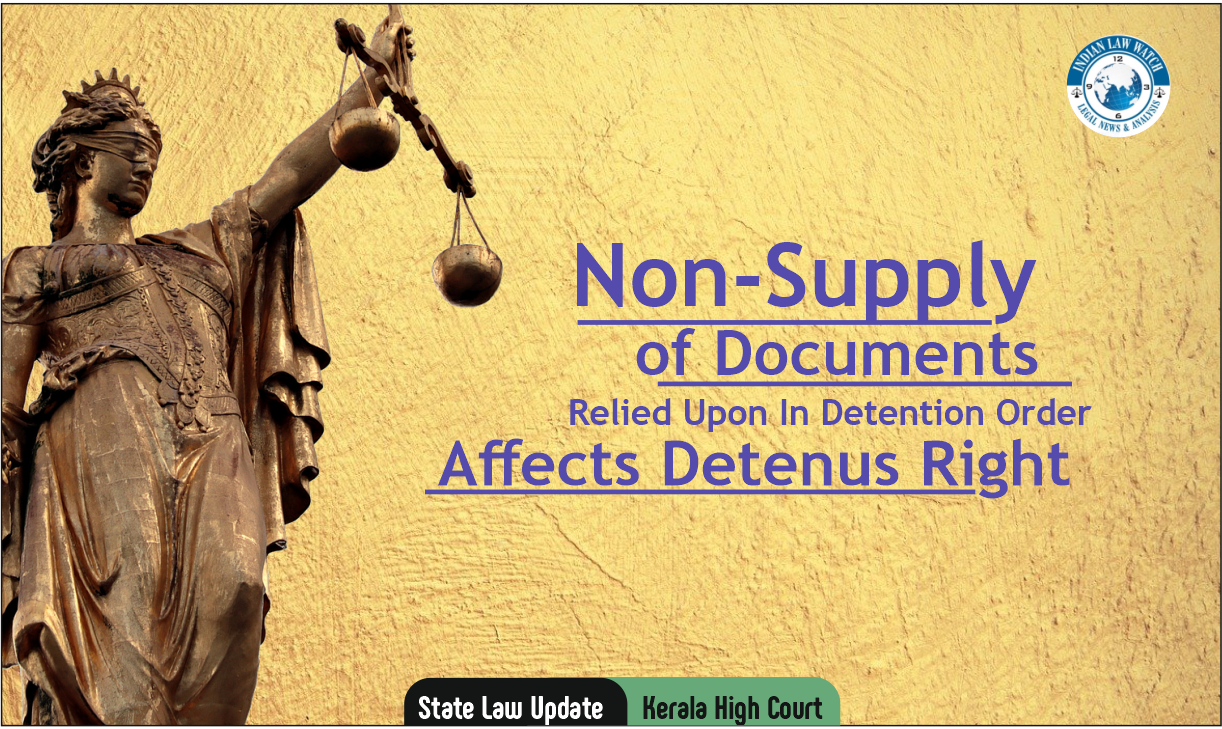
JUDGMENT HIGHLIGHT
The Kerala High Court in an extremely laudable, learned, landmark and latest judgment titled Nushath Koyamu v. Union of India & Ors. in WP(Crl.) No. 107, 108 and 109 of 2022 pronounced as recently as on June 3, 2022 held that failure to supply the documents which were relied upon by the detaining authority for arriving at the subjective satisfaction to pass the detention order affects the rights of the detenus under Article 22(5) of the Constitution of India, particularly when they were specifically requested for by them. We thus see that the Division Bench of Justice AK Jayasankaran Nambiar and Justice Mohammed Nias C.P, therefore, very rightly, rationally and robustly quashed the detention order observing that the non-supply of the documents had vitally affected the right of the detenus under Article 22(5).

The Court was adjudicating upon a plea seeking to quash the detention orders passed by the Joint Secretary of COFEPOSA against the petitioners herein in a gold smuggling case. They were granted bail by the Sessions Court before the detention order was issued.
Judgment authored by Justice Mohammed Nias CP for a Division Bench of the Kerala High Court comprising of himself and Justice AK Jayasankaran Nambiar
The specific information conveyed that the gang had recruited one Althaf Moosan Mukri for whom unaccompanied baggage was sent from Jabal Ali Port of UAE, booked in the name of the said Althaf Moosan Mukri. It was conveyed that it contained huge quantity of concealed gold and would be cleared, in the guise of genuine unaccompanied baggage containing household items. Accordingly, the intelligence officers mounted surveillance in and around the port Container Freight Station. While so, the said Althaf Moosal Mukri arrived at CFS at about 2 p.m. for clearing the baggage. He was intercepted and the unaccompanied baggage addressed to him was examined in the presence of Superintendent of Customs and two independent witnesses. The baggage declaration was signed by the proprietor of M/s. Mercantile and Marine Services which was the Clearing House Agency (CHA). The staff of the CHA, Mr. Biju v. Joy and two other representatives were present there. After identifying the baggage, the said Althaf was informed about the purpose of their visit and with his consent, items were checked. On a detailed examination, it was found that, huge quantity of gold was concealed in the compressor of a refrigerator, brought as an unaccompanied luggage. It contained 126 pieces of gold bars and one cut piece. A Gold Assayer was called who weighed it and found that, it was pure gold bars of 999 purity and it weighed 14763.300 gms. valued at market price of about Rs. 7.16 crores.”
With respect to the contentions that at no stage of bail the sponsoring authority had a contention that the detenus would further indulge in act of smuggling or that they had to be detained, cannot be accepted at all. The role of the sponsoring authority and the detaining authority are distinct and different. After the proposal for detention placed before the detaining authority, the Central Screening Committee consisting of senior officers from the different organisations will screen the entire proposal and make the recommendation and only after this stage the proposal goes to the detaining authority. Thus distinct, different and independent authorities are to examine the materials and it is thereafter that the detaining authority has to independently arrive at the subjective satisfaction to decide whether to detain or not. The detaining authority has also to satisfy itself about the propensity of the proposed detenus to indulge in prejudicial activities in future. Viewed in this background the contention on behalf of the detenus, that at the stage of bail, the sponsoring authority did not contend anywhere that the accused would indulge in prejudicial activities in future and therefore the detention orders are bad, cannot be accepted at all.
The learned counsel for the petitioner submits that in W.P. (Crl) No. 107 of 2022, the detenue had filed Ext. P12 request for supply of the documents mentioned therein, particularly, a screen shot taken from the detenus phone which was relied upon by the detaining authority. It is mentioned in Ext. P12 that there were at least six voice messages visible on the screen shot which were relied on and those messages appear to be of 19th April 2021, a day before the detenus in this case were taken into custody by the DRI. It is the contention that from the screen shot, the contents of the whatsapp chat cannot be understood and unless the chats in electronic form is provided, an effective representation cannot be made. Thus, the whatsapp chat in electronic form which was to be given on a pen drive or such other media to facilitate them to hear them and understand the content and offer the explanation has been deprived offending the right under Article 22(5) of the Constitution of India.
Similar request is made as Ext. P12 in W.P.(Crl). 108 of 2022. In W.P( Crl).109 of 2022, Ext.P12 has been made which relates to the documents pertaining to the transactions of the smuggled gold recorded from the mobile phone of Abdulla S.S. was sought for, since it was alleged that a “Syndicate” was formed, the contents of the mobile phones of, whatsapp and the other media of the phones etc. is very much necessary for making an effective representation seeking release.

The power of preventive detention is qualitatively different from punitive detention. The power of preventive detention is a precautionary power exercised in reasonable anticipation. It may or may not relate to an offence. It is not a parallel proceeding. It does not overlap with prosecution even if it relies on certain facts for which prosecution may be launched or to be launched. An order of preventive detention, may be made before or during prosecution. An order of preventive detention may be made with or without prosecution and in anticipation or after discharge or even acquittal. The pendency of prosecution is no bar to an order of preventive detention. An order of preventive detention is also not a bar to prosecution.”
It is the contention of the learned counsel for the petitioners that these details sought for were absolutely crucial as the same has been relied upon by the detaining authority for arriving at the subjective satisfaction to detain and resultantly the non-furnishing of which renders the detention order bad. The learned counsel for the respondents on the other hand contends that though there has been narration in the detention order about the screen shots/whatsapp, they had not been relied upon and hence there is no duty on them to give copies in electronic form to the detenus. Inspite of a specific request, as seen from Ext. P12 in the above cases, we find copies were not given.
It is relevant to note in the decision of the Supreme Court in Atma Ram Vaidya v. State of Bombay [AIR 1951 SC 157]. The Hon’ble Supreme Court held that :
To put, it in other words, the detaining authority has made its decision and passed its order. The detained person is then given an opportunity to urge his objections which in cases of preventive detention comes always at a later stage. The grounds may have been considered sufficient by the Government to pass its judgment. But to enable the detained person to make his representation against the order, further details may be furnished to him. In our opinion, this appears to be the true measure of the procedural rights of the detained person under Article 22 (5).”

The conferment of the right to make a representation necessarily carries with it the obligation on the part of the detaining authority to furnish the grounds, i.e., materials on which the detention order was made. In our opinion, it is therefore clear that while there is a connection between the obligation on the part of the detaining authority to furnish grounds and the right given to the detained person to have an earliest opportunity to make the representation, the test to be applied in respect of the contents of the grounds for the two purposes is quite different. As already pointed out, for the first, the test is whether it is sufficient to satisfy the authority. For the second, the test is, whether it is sufficient to enable the detained person to make the representation at the earliest opportunity”.
But when grounds which have a rational connection with the ends mentioned in section a of the Act are supplied, the first condition is satisfied. If the grounds are not sufficient to enable the detenue to make a representation, the detenue can rely on his second right and if he likes may ask for particulars which will enable him to make the representation. On an infringement of either of these two rights the detained person has a right to approach the court and complain that there has been an infringement of his fundamental right and even if the infringement of the second part of the right under Article 22 (5) is established he is bound to be released by the court”.”
The requirement under Section 8 of the COFEPOSA Act in the background of the Constitutional provision is for a reference to an Advisory Board duly constituted and it is not the petitioner’s case and the board which answered the reference in the instant case had any member who was not qualified or competent to hear the reference. The constitution of the Board was changed owing to the retirement of the Hon’ble Judges after issuance of Ext. P9. It is true that the retired Judges also could be members of the Advisory Board but extra care was given to see that the serving Judges were included in the Advisory Board. It has to be presumed, when an Advisory Board is constituted, comprising of high constitutional functionaries, that the case of the detenus will be considered with objectivity, fairness and competence, reassuring the Constitutional and statutory safeguards while expressing their opinion on the sufficiency of the cause of detention. In such circumstances, the question of detenus being put to any prejudice much less any actual prejudice does not normally arise. The interest of the detenus were sufficiently taken care of both in the constitution of the Board and while answering the reference. We find no error, much less, any illegality in the constitution of the Board or while it answered the reference and contention on that count made on behalf of the detenu is accordingly rejected. In view of our finding on the issue of non-supply, Ext.P1 orders of detention are quashed and the detenus are forthwith set at liberty provided they are not wanted in connection with any other case.”

In conclusion, the Division Bench of the Kerala High Court which has made it absolutely clear in this notable judgment that non-supply of documents relied upon in detention order affects detenus’ rights under Article 22(5) of the Constitution. It was also made clear by the Court that this is moreso particularly when they are specifically requested for by the detenus. There can be just no denying or disputing it!





